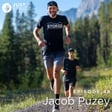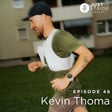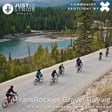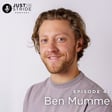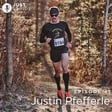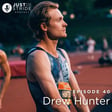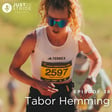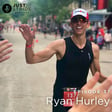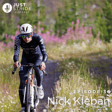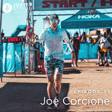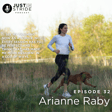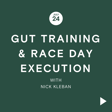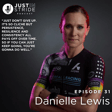Introduction to Justin's Drive Podcast
00:00:06
Speaker
Hello and welcome to the Justin's Drive podcast. I'm your host, Justin Puleze. If you love endurance sports, you've definitely come to the right place.
Focus on Sports Figures and Justin's Journey
00:00:15
Speaker
On this show, we'll talk to athletes, coaches, and professionals who can help us reach our true potential. Being a student of distance running for over 10 years and interviewing people in the sport for the last five, I've learned a ton, but there's always more to discover. Everyone has a story, and I know you'll resonate with each of our guests as we embark on this new journey together.
00:00:36
Speaker
Join us at home, on the road, or while you run. Together, we'll have some fun. So follow along on Instagram at justinstridepod and your favorite podcast platform and prepare to be inspired.
Sponsorship and Product Offer
00:00:49
Speaker
Come along for the ride with Justin Stride.
00:00:53
Speaker
This episode is presented by our friends at Exact Nutrition, a tasty and healthy way for you to fuel your body before, during, and after a solid training session. I can't leave the house without a few fruit bars in my pocket and they never make it back home. Exact is offering you 50% off your order when you use the code justinstride.
Bike Accident and Recovery
00:01:12
Speaker
So head to exactnutrition.com and fuel your goals today.
00:01:17
Speaker
My thoughts for today are around the idea that we should never take our own good health for granted, and I'll tell you why. I recently had an accident that took me out of running, or any sport for that matter, for about a week and a half. It happened right outside my house on my bike going super slow, barely pedaling.
00:01:36
Speaker
There was a curb that my front tire cleared, but my back tire did not. And the next thing I knew, I was laying head first on the ground with blood dripping from my forehead. Stitches were required and I somehow had major bruising in my lower abdomen, which wasn't super comfortable. I was mad at myself for letting it happen, for not being more careful. But of course, it could always be much worse. I've slowly come back to running and so grateful to feel good doing it again.
00:02:05
Speaker
So be safe out there and cherish whatever form of movement you're able to do today, wherever you're at in the process.
Guest Introduction: Faye Alice
00:02:13
Speaker
On today's episode of Justin Stride, I sat down with ultra runner and adventurer Faye Alice. Faye grew up being active and ran for her school. Dance, however, was what she wanted to pursue as a career until she realized she may have reached her potential and decided to move on. Where dancing stopped, her running continued.
00:02:33
Speaker
finding joy on the roads and later on the trails.
Faye's Passion for Running and Training
00:02:36
Speaker
Over the years, her passion has grown, but also the distances, as she takes on multi-day races of 200 miles and beyond. Of course, with the Canadian Rockies as their training ground, there's endless opportunities to explore for hours on our own two feet. Hi, Fay. Welcome to the Justin Stride podcast. Appreciate you taking the time.
00:02:56
Speaker
Thank you for having me. I'm super excited for my first podcast. I'm excited too. I love, I love that we're your first and it means no one's heard your story on this format. So I'm super pumped about that. Yeah, me too. Thank you. Yeah. Your name from our friends at exact and maybe we can start just like, how are you, how do they know about you? How are you connected with them? And what's the story behind that?
00:03:23
Speaker
Yeah, absolutely. So my best friend Nicole Atmer, she had a relationship with Xact for a couple of years.
00:03:32
Speaker
Um, but I originally came across exact when I was wearing braces on my teeth and I was training for an ultra and I couldn't really find any nutrition that didn't stick in my braces as disgusting as that sounds. Um, and I came across exact and yeah, I was like, this stuff is gold. Like the gels are not gels are a little bit more chewy. They didn't get stuck. So yeah, I was hooked on exact when, um, when I have braces.
00:04:02
Speaker
And then Nicole was like, Oh, you should meet the team. Um, Alistair is from England. Like they're, they're super neat. And she, uh, she made the connection there. So that was awesome. And I've been with exact now for just over a year. So that's where your roots are based in England, right? So you have that, that connection with Alistair through that word. Did you grow up in similar places or.
Athletic Background and Competition
00:04:25
Speaker
Yeah. So I grew up in the Northwest of England in Liverpool. Um, and I was there up until I was 19. I'm now 34. So I've spent quite a bit of time away from my motherland. Um, but yeah, I think Alistair is more down South. Um, so yeah, we're not from the same area, but we definitely have English roots. And what was it like to grow up there? Were you athletic as a kid? Um, was running a big part of your life, even at a young age?
00:04:55
Speaker
Yeah so I've always been a super active kid growing up into my teens. My mom actually has funny stories of like she'd take me to the park when I was younger and I wasn't interested in any of the apparatus, any of the swings, all I wanted to do was run. So she'd spend a lot of time chasing me around fields and trying to catch up to me which I think is pretty neat.
00:05:20
Speaker
And then growing up, I was very much into like every single sport. I wanted to try everything. I was part of like so many different teams in both primary and high school. But my main focus when I was younger, I was a dancer. So my mom put me into ballet classes when I was two. And I danced all the way up until I was 18. But I also ran as well. So when I was eight, I was picked for the local athletic club.
00:05:50
Speaker
And I was kind of spotted at a sports day in primary school, which I think was pretty neat. And then I ended up on the Southport and Waterloo Athletic Club team. So I did a lot of like sports hall, indoor sports hall events, a lot of track and field, cross country running, which I absolutely hated. There was nothing worse than going out on a winter's day. You were in like these tiny shorts, crop top, it was freezing cold, and you had to run like,
00:06:19
Speaker
5k which was such a big distance when you're like nine years of age um but yeah i for me like running has always been my constant um when i turned 18 it was more of like am i going to continue to pursue dance to make it a career of some sort
00:06:37
Speaker
And I always dealt with a lot of like insecurities and self confidence when I was younger. So I didn't see myself as a good enough dancer. But then running for me has always been like the way to keep my fitness up. And I've continuously run, I guess, since I was eight up until today. So it's been a it's been a long time sport for me, that's for sure. Yeah. And was it was sport important in your family or did
00:07:04
Speaker
or did your parents encourage you to do sports? Or is that just kind of what you fell in love with? Because you clearly had a knack for being physically active.
00:07:15
Speaker
Yeah, so I wouldn't say my parents are that sporty in themselves. My mom, my dad divorced, but we had a really healthy relationship growing up. But my mom would always take me on like these hiking vacations. When I was younger, so we'd always go off to the Lake District or to Wales and we'd spend like two weeks hiking. So she was very much into the outdoors in that sense.
00:07:41
Speaker
But in terms of sports, I definitely didn't grow up in like, you need to compete in this or that. But they were very supportive of the fact that I just took a knack to it. And I was just really like intrigued by different activities. And yeah, I guess growing up, I've always had this like competitive edge.
00:08:03
Speaker
So I've always been like intrigued as to what sports I could excel in and what sports I'm good at. And for the most of them,
Transition from Dance to Running
00:08:11
Speaker
I'm very much like a mid pack, pretty average.
00:08:17
Speaker
like sports person, I don't excel in absolutely anything, but I love giving everything a go. I'm definitely like a try harder in that aspect. So what does that look like in terms of when you're that competitive, but you're also not at the top of the sport?
00:08:38
Speaker
How do you deal with defeat and stuff? Was it always a healthy relationship that you had being competitive? Because I can say I'm probably similar in that regard. Always worked really hard, very competitive with myself, but then I wasn't one of these super elites growing up at all. Yeah, and I think my relationship with it has definitely changed as I've gotten older and more mature.
00:09:05
Speaker
Um, but I'll always remember I was in the sports day when I was eight, um, in primary school and I hadn't really done like a running event before. And I think I was in the 100 meters. Like we had a very small track and it was a couple of laps. And I was like the kid who signed up to everything on sports day. Like I wanted to do it all.
00:09:29
Speaker
So I remembered being part of this 40, 50, 100 meter race. I forget the length. And I was coming first. And I remember my mom was there yelling and screaming for me. And I was like, oh my gosh, I'm going to win this sports day event. And then right at the last minute, I got nipped by the sporty kid who was amazing. Her name was Ria. And still to this day, I'm like,
00:09:57
Speaker
she was my my young idol and she nipped me at the finish line and I just remember like that really stung and then to this day even I'm like gosh if only I ran a little bit faster or I didn't look back and saw her over my shoulder so I think that was my first taste of like
00:10:16
Speaker
Oh, you can't get complacent when you're like coming up to a finish line. You like need to give it your all. And then from that moment onwards, it was always like, okay, I obviously can run and I can do it well. And then that's when I got picked for the, uh, the athletic club.
00:10:34
Speaker
But then when I became a part of the Athletic Club, it's like kids from all different schools and they're so great and they're so talented. So to be up against those levels, I was always the B runner, not the A runner.
00:10:48
Speaker
And I definitely struggled with that as a child.
Life in Canada and Discovering Trail Running
00:10:51
Speaker
I remember I would go to these competitions and I didn't feel good enough. And even though it was a collaborative point system, if you all took part in a race, all of the points would be added up for the club. And I just remember
00:11:08
Speaker
because I was the B runner I was like oh I'm not that great anyway because I'm not in the A category um and I just always had this like self-doubt but my parents were really supportive um my club coach was really supportive and like everyone around me never like ever said anything bad or put me down but it was always like an internal belief
00:11:32
Speaker
And that's definitely followed through, like even into my adult life, like I, I've come a long way, but there's still like certain areas where I'll doubt myself and I'll feel like, do I have what it's capable to, to be in a pack with like these really strong runners. But I think over time.
00:11:52
Speaker
my thought process has changed to the point of like I'm not here to race like the elites are the elites you've got your really good runners you've got your back of the pack runners and I'm somewhere in the middle there and I'm okay with it like now I'm pretty much chasing these goals because
00:12:10
Speaker
It's something I want to do to test how strong I am both physically and mentally. So for me, it's not more about the competition anymore. It's more of an internal competition of how good can I be and how far can I go with the sport rather than
00:12:27
Speaker
I'm out to be X, Y and Z. Cause that's not my jam. Yeah. This is rather than, this is where I'm ranked among others. You can better quantify that with your own results in your own events and how you place from year to year. Exactly. And I mean, with ultra running, especially like it's, there's never going to be the same situation, even if you go and do the same race.
00:12:56
Speaker
like weather changes, courses change, like one year you may be fitter than the year prior, like there's so many different like circumstances that can affect a race. So I think it's really hard even to like judge yourself on a particular event to see how far you've come. There's always going to be different factors in it.
00:13:18
Speaker
But yeah, I'm very much someone who likes to push the distance now and that's kind of how I like gauge my own. How far am I going? How far have I come? Like how far can I take this? And I find what you said too, when you lost to that other runner at a young age, I have something very similar that happened to me, but not even in a race. It was to make a certain event that our school would go to in high school.
00:13:44
Speaker
And it was a distance event that the school would send a certain number of kids, and all the schools would send kids, and they would do this race in the middle of Montreal. There's a mountain there, and they would do a cross-country-style thing. And I never got selected. I really wanted to go. And this was at the age of, I don't know, 12? Yeah.
00:14:05
Speaker
But I didn't realize what that did to me until later when, you know, all these kids, I've got to go with the hyper kids, you know, the sporty, really sporty kids. And then now I'm doing, you know, marathons and, you know, ironmans and stuff like that. And somewhere in the back of my mind, it sits there, you know, that I didn't get chosen or I wasn't good enough. And that becomes like a motivation to know that, you know, I can now do the sport that I want to do. I don't have to be selected. I can just,
00:14:35
Speaker
do what it is that I want to do what I'm passionate about, you know, a hundred percent. And I think that's the beauty of it. Like back in the day, like you said, it was very much selection based, but now if you want to go and run a hundred miles, 200 miles, whatever the distance or the event, like that's up to you and there's no one stopping you and your limit, like there can be no limits. Like you can put yourself in.
00:15:01
Speaker
the face of these hard things and you can give it your all. And yeah, I love that. I love that about running. It's just such a freeing sport. Totally. And you kept doing the dancing as well. So that was clearly a passion for you, but one that had to eventually stop where you had to
00:15:22
Speaker
Make a decision. Do I continue or do I not? Was that more your thing than the running was? Yeah. And again, this is where this whole like confidence aspect comes into it because some years I identify myself as a runner growing up. And then other years I'd be excelling in dance and I'd be like, no, I'm a dancer. So I toyed between the two of them.
00:15:47
Speaker
But when I was younger, I very much had this vision of I wanted to go and dance on cruise ships, or I wanted my own dance school, or I wanted to teach dance in high school. Like I toyed with all of these different career options, whereas running, like I didn't think I would ever be able to make a career out of running. So I think that's why I focused more on dance right through to the age of 18.
00:16:14
Speaker
And then I was at the point of like, again, there's so many other amazing dancers out there. Do I have what it takes? And again, it just falls into that whole like self-confidence belief system, too. But also the fact that there were so many incredible dancers around. And when I got a taste of like going to London and like different areas in England and just seeing like the amazing dancers out there, I was like, I do not stand a chance.
00:16:42
Speaker
And then it was very much like, OK, I need to focus on putting like my energies towards something that I can make a career out of, which was as far away from dance as possible. But then it's like, OK, well, what can I continue into my like adult life, like into my 20s and beyond that I really enjoy and running has always been that constant from such a young age.
00:17:08
Speaker
So that's when I was like, okay, I'm going to like do a park run. I'm going to do these 5k park runs in London. I'm going to like sign up to my first half marathon and then a marathon.
Dance as a Hobby and Canada Experiences
00:17:19
Speaker
And yeah, it just continued on. What type of dance were you into? Um, so I did ballet, tap, modern jazz, um, and some contemporary as well. But my favorite was ballet.
00:17:33
Speaker
And it's funny because I have the flattest feet. So if you saw it, like if you literally saw my feet, you'd be like, and that's why you didn't make it. So can you put it all on self-confidence or was there, you know, how does it work in dance? Is it, you know, if you work really hard, you can be successful or is it?
00:17:53
Speaker
There's clearly got to be some talent involved in anything you're doing. Did you have support from coaches and stuff to push you to continue in that direction? Or was this all internal again? Yeah, I definitely had support from my dance teacher, from my high school dance teachers as well. But it's just a very competitive field and it's based on a lot of different factors.
00:18:21
Speaker
I was putting in the work, that's for sure, and I would say I was a pretty AOK dancer, but then in comparison to other dancers who can wrap their legs around their head and they're right up on point and I'm just about making it with my flat feet, there's definitely a level of natural ability to and physique.
00:18:45
Speaker
Yeah, I just don't think I quite had what it takes to have made that a career. And was there a way for you to maintain that in your life, even though you had to give it up in competition and such?
00:19:02
Speaker
Yeah, absolutely. So when I went to university, I still made sure I signed up to the ballet class on a Tuesday evening. And then whenever I've moved around places, so I lived in America for a summer time, I looked up to see, is there any options to do any dancing out here?
00:19:24
Speaker
And then like when I came to Canada, again, I studied at Thompson Rivers and Kamloops for a year and I took the opportunity to like take part in dance classes there. And then since moving to the Bow Valley, and this is where I've been for the past 14 years and the Canadian Rockies here.
00:19:44
Speaker
I, yeah, I've always like wanted to get involved in the dance community, but it just, it hasn't been something that's taken off. But I still do like my home workouts. They still dance around my kitchen. I'm doing pirouettes whilst I'm waiting for pasta to cook. So it's, I haven't lost it. And it's funny because I'll often like be at work waiting for something to print and I'm like tap dancing by the printer.
00:20:09
Speaker
It's just it's those movements that I don't think I'll ever be able to fully lose
00:20:15
Speaker
That's cool. That's good. I think it's like a nice hidden talent to have too, you know, if you can, if you can move in such a way, I think that's great. So kind of everything was coming to the dance, you had to quit dancing. And then, you know, around that time too, you decided to make, you know, move countries by the sounds of it. Like, where were you at that stage in your life? What was becoming the priority? Was it sport or was it education or was it where you were going to live?
00:20:43
Speaker
Yeah, so as I kind of transitioned from high school and college, it was then time to pick something to study at university. And I'd always had this desire to travel and to go to different places and see as much of the world as I possibly can. And I wanted a way to combine that with education as well. So I decided to do a tourism management degree.
00:21:09
Speaker
And it was excellent. It opened up so many different opportunities for me. I did my degree at the University of Chester, so that's where I started and ended it. But then for my second year, I was able to do a study abroad opportunity, which brought me to Canada. So that's when I got my first taste of Canada and absolutely fell in love with it.
00:21:31
Speaker
Um, and then I also got an opportunity to work in Walt Disney World in Florida and to work in a couple of the Greek islands. So yeah, that was kind of my focus in my twenties was to gain as much like life experience, travel around, meet as many new people as I possibly could. And then I just had this like desire to come back to Canada. And when I went back to England to finish my degree, I got a really good job in London.
00:22:01
Speaker
with the Association of British Travel Agents. So it's called ABTA. It's right in the heart of London. It was very much like, this is a job that I can make a career out of for the next 40 or 50 years if I wanted to.
00:22:16
Speaker
And I started off as an intern. They offered me a full time position, but I had this desire to come back to Canada. So I was in this like limbo state of do I stay in England and this is my life for the foreseeable future or do I book a one way ticket to Canada.
00:22:34
Speaker
get a work visa and just see what happens. And I went with option number two, because when you're, I guess, 21, it's like the world is your oyster.
Settling in Canada
00:22:45
Speaker
So I booked that one way ticket back to Canada and I have never left.
00:22:50
Speaker
Wow, that's crazy. Yeah, this has been home. So yeah. So you've been to Canada before you moved there, obviously. But before you had even been to Canada, what was your vision of Canada as far as what did it look like? Because I always find this interesting, what people think Canada is versus what it is. Because I don't live in Canada anymore. I'm in Switzerland. Yeah.
00:23:16
Speaker
But I get to talk to people that have either been or are thinking about going. Yeah, absolutely. So my vision of Canada is, you know, your typical Lake Louise, like your bright blue turquoise lakes, the mountains. Um, honestly, I didn't really know about wildlife when I was in England. So I didn't really have like the grizzly bears or the cougars in my head. It was more of like.
00:23:43
Speaker
this vast wilderness and not cold either. For some reason, I always thought Canada was always lovely and warm and green and lush. But when I very first got to Canada, that was in 2010. And I think I mentioned I was working in Walt Disney World and I flew from Orlando to Kamloops to do my first or sorry, my second year of my degree.
00:24:09
Speaker
So I hop off this plane from having spent a summer in like this fun environment. And I step off this plane in Kamloops and I'm like, this doesn't look like what I imagined. And Kamloops is like very desert Canada. So there's no trees, like everything has that real dry feeling to it. And I was like, oh my goodness, like what have I got myself into?
00:24:33
Speaker
And it took me about two months to warm up to Kamloops. And I had a great experience in university there for my second year. But I was very much like this, this isn't what the postcards look like.
00:24:48
Speaker
And during that year, I did a quick weekend trip out to Banff with a girlfriend. And we did as many activities as we could. We went dog sledding. We did ice climbing. We just jam-packed this weekend in. And that was my first taste of the Canadian Rockies. And I think it was that experience where it was like, I need to come back to Canada on a work permit.
00:25:15
Speaker
where I'm not tied to one location and just really explore the Rockies because it's just so beautiful. And that's kind of what I did when I was in London and I booked that one-way flight to Canada. It was to arrive in Calgary, head straight on a Greyhound to Banff and start this year of like working holiday. And then that one year turned into two years and then it was like,
00:25:43
Speaker
gosh, I need to find a way to stay because I don't want to give this up. Like this lifestyle is amazing. And from there onwards, it was like, how can I make this, how can I make this real? Like, how can I stay here? So yeah, for the rest of my 20s, then it was very much like, what's my game plan in order to become a permanent resident to then become a Canadian citizen, which
00:26:08
Speaker
2019, I think I got my citizenship. Wow, congrats. Thank you. Amazing. Now I identify more as a Canadian than I do British. Sorry, England. I think you see Canada the way most people see it. They see it as the Rockies. They see it as these great mountains, kind of like Switzerland's known for these beautiful, the Alps and stuff.
00:26:35
Speaker
beautiful nature and stuff like that. I'm from Montreal in the East Coast, so it's not quite that. It's a bit different than what you see over there.
00:26:46
Speaker
And there's just, there's so much more to explore too, right? Like I feel like as far east that I've made it is to the border of Saskatchewan. So like there's still so much more of Canada that I haven't even touched. And I have a desire to travel. Like I would love to go out east or in fall and like see all of the beautiful fall colors. And there's so many running trails out that way too. Um, but yeah, at some point I'll make it out there.
00:27:14
Speaker
What's the biggest challenge for you being away from where you grew up?
00:27:19
Speaker
Yeah, I think the biggest challenge is obviously maintaining relationships with friends who I absolutely love and adore and have had friendships since I was a kid, right? So that's really hard maintaining them and just seeing like friends get married and have families and like, I can't be a part of that day to day. So I think that's the biggest challenge.
Maintaining Connections with England
00:27:43
Speaker
And then also like keeping on a regular schedule, even to just touch base with family too, like,
00:27:49
Speaker
We're on a different time zone. And even though it's seven hours, like if I get home at 6 PM, it's 2 AM in England. So it's like.
00:27:58
Speaker
It's really hard to keep like a constant connection going with people back at home. Yeah. That's what I find too. It's, uh, living somewhere else, you know, it just, the time change alone is a big enough challenge. And then, you know, of course you don't live there anymore, but you know, doing phone calls and, and I think now with FaceTime and, you know, the zoom and stuff like that, it helps certainly. Um,
00:28:23
Speaker
Yeah, and i like i love to post on instagram and it's like mainly for like family and friends back home so that they can see what i'm doing they can see i'm still alive like yeah and yeah it's a great tool to keep people updated that's for sure.
00:28:42
Speaker
So what did this do for your running? You know, you're living somewhere else. You're living in the Rockies. You're adventuring, exploring. I don't think there's a better, you know, it's one of the best ways to see a lot of stuff is on foot. Exactly.
Exploring the Rockies and Trail Running Adventures
00:28:57
Speaker
And before I'd even come out here on that one year work visa, I'd already signed up to the BMO Vancouver marathon. I'd signed up to the Banff marathon because I was like, I'm there for one year and I just need to fit in as much as possible.
00:29:12
Speaker
And I hadn't started trail running back then. I was very much still a road runner. And I got to Canada and I was hiking and I was doing what a lot of locals call as peak baggings. So I'd like hike up all of these different mountains and like take off as many as possible. I remember one day my girlfriend was like,
00:29:34
Speaker
Do you know that you hike really quickly? And I was like, huh? And she's like, yeah, you're powering up these mountains. What's the rush? And I'm like, I don't even realize that I am. I feel like it's just my natural rhythm.
00:29:48
Speaker
And she's like, have you ever thought about trail running? And I'm like, what's that? And she's like, well, you literally run on trails and like you don't necessarily run up the mountains, but you give it like a solid effort and then you get to run down the backside of them. And I'm like, Oh my gosh, this sounds incredible. And it was just a thought that came and went and I didn't really pursue it. And I remember going out onto my first like backcountry trip.
00:30:16
Speaker
And I had this massive pack, and I was like over-prepared, and I was going into a place called the Senebuoyen. And I think I was taking about three days to get into it, and it's about 70 kilometers. Actually, no, that's a lie. It's probably about 30 kilometers. It's not that far.
00:30:35
Speaker
And I was going in with this massive pack and there was a couple of like ultra runners like running by and they had like hardly anything. And I'm like, how in earth are they doing that? Like, why are they not rolling their ankles? Like I was mesmerized by like these trail creatures I used to call them.
00:30:52
Speaker
And over the years, it just became this natural progression of like, I'm a hiker. I go into the backcountry. I'm starting to run on trail. I'm going to up my distance. I'm going to sign up for my first ultra. And it's yeah, it's really been this natural progression of like exploring places on foot.
00:31:12
Speaker
And now I couldn't find a better option or a way of moving through the mountains. Like if you can travel last, sorry, if you can travel light fast and you've got the endurance to keep going, there's just so much opportunity out there and you can fit in so much without needing to take like extended weeks of vacation and stuff, which is pretty good.
00:31:36
Speaker
For sure. Was it always like a daily thing for you in terms of running or when you say it was a progression, were you running once a week on weekends or were you like a three, four day a week runner? What did it look like for you then and what does it look like for you now?
00:31:57
Speaker
Yeah, so in the past, I've never really had like any structure for running. I would go out and I'd run whatever tempo, whatever pace that brought the day. Like if I had music playing and it was an upbeat song, I'd be running fast. If it was slow, I'd be running slower.
00:32:16
Speaker
I would run as often as I could. Um, I wasn't really into rest days and yeah, I just, I ran pretty much every day, which is very unhealthy. Don't do that kids. Um, but yeah, I would run a lot and it was always on road and I'd find myself, you know, having these like aches and pains and places and little tweaks, never really injured, but there'd be often like days where I'd be like, Oh, my knees sore today or my lower back, et cetera, et cetera.
00:32:46
Speaker
And then in 2018, I started running more on trails. I think I did my first ultra in 2016. And then it was kind of like, oh, I did that once. I don't need to do that again. But then I picked it up again over like 2017, 2018. And I found that every weekend I was going out and I was just doing these like big distances because I just wanted to cram in as much as I could on my weekends. And it was awesome.
00:33:16
Speaker
But then I got to the end of that summer and I was like, I feel really flat and really kind of stale. And I think I could be over trained because I'd started, you know, reading up on articles and delving more into like the science of, uh, of ultra running. And I was like, yeah, I definitely think, um,
00:33:40
Speaker
a little bit over-trained. And then my boyfriend at the time, he was like, why don't we do a lactate test and get the science behind it? And he was really into like geeking out on science and stuff. So he bought the kit, he taught himself how to do lactate reading.
00:33:58
Speaker
we went inside of like a home gym with a treadmill and yeah he was finger pricking me every like three minutes or so yeah and yeah he was um very like intellectual in the sense of like he could pull the graphs together and yeah all of that jazz so
00:34:17
Speaker
He gave me my results and he's like, yeah, you are hitting like zone three at like 130 beats per minute for heart rate. Like you are over trained. It's time to like take a step back. Um, and then I was like, yeah, but I, I've done so much in terms of running. Like I want to see how far I can keep going at this point. And I want to start racing. And he's like, honestly, I would start working with a coach. Um.
00:34:46
Speaker
and really dial it in. So I've gone from being this runner who will do running every day, hard, slow, you name it, I'll go for it, to now I'm very much like, okay, the science behind this, if you want to exceed in big, lofty distances, you really have to take a more strategic approach to running.
00:35:10
Speaker
So I have worked with a coach for the past couple of years. I'm on a bit of a break right now. But I work with Jen Sager, who is based on Vancouver Island. And she's amazing. And she's taken me from a place where I've been very over trained to a much more like manageable training plan. I feel really fit and healthy.
00:35:33
Speaker
rest days are super important. Um, yeah, I've definitely come a long ways in terms of like how I approach running and training.
Coaching and Structured Training Benefits
00:35:42
Speaker
Do you think you would have got there on your own or honestly, yeah. Yeah. Like I, I definitely can read books and read articles, but I'm very much someone who,
00:35:56
Speaker
will do more than what's actually needed and that's been like a hard thing to grasp is like less is actually more but Jen has really like enforced that with me and especially when it comes to like slow steady running keeping in those low zones she's taught me a lot
00:36:17
Speaker
And then in terms of like rest days, making sure like I have at least one a week where it's full rest. Like you don't even go and do some stretching. Like you take the day off, um, which is awesome. And then on like a four week build, when I get into that fourth week, it's like you do more cross training. You have two days of rest a week and it's really trusting that process of like you're paying a coach. She's got all of this experience.
00:36:46
Speaker
she works with a ton of athletes so she's also got a lot of athlete experience and it's like you just have to trust that process to know that you're going to benefit from it and so far i would say that yeah it's been like night and day for me like i very much enjoy working with a coach and
00:37:05
Speaker
I think even moving forward, I will continue to have a coach just because it's accountability too. Like I don't have to think about it. I just go and do the workout, you know? Yeah, that's great. It's cool. And how did you find Jen? I always ask this, I like to ask this question anyways. I find it interesting.
00:37:26
Speaker
When people make the change finally, or you know, have been training by themselves and decide to move to a coach, how do they find their coach and how they select their coach? And if it's like a rigorous process, if it's something that's just seamless for them. Yeah. So I did a lot of research, um, when I was looking for a coach, because I'm like, if I'm going to invest in this, I want to make sure like she's a good fit or he's a good fit.
00:37:50
Speaker
So I did put a lot of research like into Google and the internet and through word of mouth as well to see who others have been trained by. But Jen really caught my eye because she's an adventure racer. So it's not just running like she's very much into biking and she's got other aspects like paddling. Not that I'm a paddler by any means, but it's like for me, I very much love other activities like cross-country skiing, mountain bike, gravel riding,
00:38:21
Speaker
So to find someone who's not just running focused, um, was really enticing. And then also the fact that Jen is more of like a time on feet approach versus speed. And again, like so many factors for me play into like how I feel on a day to day basis, whether that's work or relationships or friendships. Like I'm a very introverted person and I get really tired by like,
00:38:51
Speaker
situations and social situations. And I feel like Jen takes in a lot of different factors when she's training people. So yeah, I really enjoyed that about like when I was researching Jen and just like everything that she brings to it.
00:39:06
Speaker
And then she also brings a very like female perspective as well. Um, and like no offense to guys, but when you're working with a coach who literally like has the same autonomy as you, like, yeah, it's, uh, it's, it's good to work with a female coach. That's for sure.
00:39:23
Speaker
Yeah, just something that's relatable and they know you better for sure on that side. It's just as important to know the athlete and to help them succeed for sure. So maybe that plays into what you're after in terms of your running goals, and it's not so much speed, but the time on your feet and the distance you travel, right?
Ultra Running Goals and Race Across Scotland
00:39:50
Speaker
Exactly. It's definitely been a progression of like, okay, I can run a marathon. Let's try a 50K. Okay. I can run a 50K. Let's try like a three day stage race of like shorter distances, but back to back. And then as the years have gone on, it's progressed to.
00:40:09
Speaker
100 mile race, 120 mile race and now I'm in like that 200 mile category which maybe I should have done a few more hundreds before getting there but at the same time it's like I feel strong, my body is holding up, mentally I'm strong and I just want to keep rolling with it for as long as possible and yeah like the 200 distance for me it's like a combination of
00:40:37
Speaker
running, hiking, navigation. It's very much like a food strategy. Like there's so many different factors of it that it's not just, I'm out there to run. Um, and that's what I really enjoy about those like longer distances. There's just a little bit more to it in terms of like the different aspects and the things that are very much out of your control, but you have to have a plan in place for
00:41:03
Speaker
for tackling all these different things that are going to come up through a distance, um, of that one. Yeah. I think when most people hear it, like when I hear it, I don't know what that entails, you know, uh, 200, you know, K or mile race.
00:41:22
Speaker
people take these adventures on and I'm just asking myself, what kind of training do you have to do in terms of time on your feet? What does it look like? What would you say is the biggest thing you need to do in order to be prepared for a crossing across Scotland, for example?
00:41:42
Speaker
Yeah, so I really think having a solid base is important. And again, can you really train for a 200 miler? Can you actually do enough? I don't know if that's possible, but obviously consistency is key for any event, especially event of that distance.
00:42:03
Speaker
Um, so I think it's just training your body to get out and be able to put in those really long days. And if you can do training, which is back to back. So you go out one day and you maybe do a 12 hour run. And then the next day you get up and do an eight hour run. Like you're just combining those, those big days together. But ultimately to get to a 200 mile distance, it's like, you need to make sure your nutrition and hydration is on point.
00:42:32
Speaker
and that you're experimenting with like the different options of food out there, what your body can handle, what it maybe can't handle. And that for me is still like a huge test because even though I put myself out there and I raced across Scotland, I only made it to the final checkpoint before my body gave in. And it was a combination of
00:42:57
Speaker
I guess everything built up and maybe not fueling enough or maybe not drinking enough water. Maybe I had an electrolyte imbalance. Like it's really tough to say, but I love the fact that it's like, it's this continuous goal of like, okay, what can I do better next time? Or like, what can I do differently? Or like, I haven't tried this before. I'm going to experiment with this.
00:43:20
Speaker
So I'm very much just scratching the surface But I do plan to go back to Scotland in 2025 And have a second go at it and I truly believe that I gave it my all during the first go Everything felt amazing like I was eating more than I'm used to I was staying on top of hydration and I truly thought I had it in the in the
00:43:47
Speaker
in the pack, like I thought I was going to complete this race. So when things took attempt for the worst, I'm like, damn it, like there's something missing here. Um, but I think that's like the fun part of these distances is that it's always trial and error. And what would you say as is usually that point for you in, in, in races, what are the most challenging points for you? You know,
00:44:13
Speaker
Yeah, so one of the bigger challenges for that race in particular was the navigation aspect of it because it's not a course marked route. So you very much get a GPX file. You can load it into your watch. Who's to say your watch is going to last? Like you still have to have like the compass skills and the map reading skills.
00:44:36
Speaker
Um, so for me, I spent a lot of time like losing sleep over thinking I was going to be lost in the middle of a field. Um, so I was very like nervous about the navigation aspects of that. Um, but it's fun to train yourself and to pick up new skills on like learning how to map read and like putting yourself in those situations of like, it's pitch black, it's 2 AM, you're in the middle of a field and like you have to find your way through. Um, so that was awesome.
00:45:06
Speaker
And then also in the race itself, it's keeping on top of eating, it's having a game plan in place of like, okay, when I get to the next checkpoint, I'm going to consume X amount of calories whilst I'm out between different legs, I need to be eating maybe 150, 200 calories every half an hour.
00:45:29
Speaker
And again, like I say, between 100 to 200 calories, because I just haven't I haven't nailed it yet. And it's just a work in progress for me. But I think, yeah, it's definitely like a food eating contest when you're out there on those long distances. But then mixed in with like all of these other things of like learning to navigate your way through a course like
00:45:53
Speaker
When you're doing that, you still have to remember like, I have to eat, I have to drink, like I have to keep putting one foot in front of the other, however that may look. Yeah, it sounds like running's the easy part in these types of events. And are those, is that event a crew event? Like, you know, to a certain extent, crews do the thinking for you. They should be trying to think of all these things for you so you can just focus on moving forward.
00:46:23
Speaker
Yeah, so that event definitely allows a crew to meet you at the different like checkpoints along the way. And it also allowed for them to meet at different points on course as well, whether like the trail crossed over a road, you could have your crew there. But I was very much in the mindset of like, nope, I just want to see my crew at the checkpoints and be self supportive to some extent whilst I'm out on the different leg.
00:46:51
Speaker
Um, so I definitely met my crew at the checkpoints. There was 12 of them in total and they were equipped with a van, um, all my foods, like all of my supplies. But the funniest thing is it was my first time that my parents have crewed. So they have no idea about ultra running. They see me do these races. They see the Instagram updates, but they have no idea what it actually entails.
00:47:20
Speaker
So when I told them I was coming back for a visit and I was also combining it with this like 200 plus mile race in Scotland and asked them if they'd be my crew, they didn't hesitate for a second. But I don't think they realized what that actually entailed. So by that last checkpoint, they were fast asleep when I rolled in. Yeah, bless their hearts. So I think for me, it was more of a sense of like,
00:47:50
Speaker
Make sure your crew are equipped, but make sure I've still got something in the tank for when I get there to guide them through it. And by, by the middle point of that race, they, they definitely had their systems dialed. They knew what to expect. Um, but I, I don't think they realized how tired crewing is. And it is, it's tiring. Will they be on the crew again?
00:48:16
Speaker
Yes. They want to see me succeed in this race, I think more than I want to succeed. So yeah, they're definitely going to be there for the next goal. Are they a worrying type or are they super encouraging, like pushing you to do it? They're super encouraging, which
00:48:35
Speaker
I didn't think they would be when I told them I wanted to do it second round time, just because I ended up in hospital after that last checkpoint. And my mom and dad got to see me in a place that I don't think was very comfortable for them.
00:48:52
Speaker
So I was like, oh, if I sign up again, they're probably going to be like really worried and like, is this the right thing to do? Like, do you want to put your body through this again? But much to my surprise, they're like, nope, we're going to be there. We're going to make sure you get through that finish line. Like, there's no stopping you, lady. And I'm like, that's that's the spirit. That's what I need from them.
00:49:13
Speaker
Is this the only type of racing that you're interested in now? Like, you know, those longer distances or do you think, you know, do you do other distances in training blocks leading up to those, you know, bigger adventures?
00:49:27
Speaker
Yeah, like I'll still dabble in like half marathon road runs. Um, like the smaller distances, I guess I have a 50 K. I don't know how I can say that small, but I'm still interested in those types of races. Um, and I think it's really like fun to keep like enthusiastic about all different types of running.
00:49:51
Speaker
But for me and where I'm at, I just love pushing myself. I love having these really big lofty goals that I may or may not be able to achieve.
00:50:03
Speaker
because so many things have to go right on the day to be able to get across the finish line. That to me is so intriguing, and that's what inspires me to sign up to these events. Knowing that so many things could go wrong, and it's like a problem-solving expedition, that yeah, for me, I'm just really intrigued by the bigger distances.
00:50:26
Speaker
I think you're falling more in that exact thing, expedition type runner now, adventurer type, you know, when you get, I think over a hundred miles, maybe that's, I don't know if there's a definition for it, but that's what it sounds like when you're doing these crossings and, um, you know, multi-day adventures, you know, so self-sustained almost, you know, um, yeah, that's pretty interesting.
00:50:55
Speaker
That's the thing, I love being outside and I love being outside for extended periods of time. So I'm like, why not do these races? Why not put yourself out in the elements and experience all the different weather types? And believe me, racing across Scotland, I got hit with it all. Everything except for snow. But it was August, so I'll give it to Scotland. The weather was typical.
00:51:22
Speaker
Um, but yeah, I just, I love being outside and just like facing, like feeling the wind on my face and like being on top of a mountain and like, I dunno, just like that hardcore feeling. Like you just, you can't beat it. It's, it's pretty epic. It sounds like it. Is this, is it a lonely place for you because it's hard to find training partners?
00:51:47
Speaker
for such distances, whereas if you're trained for, let's say, a marathon, half marathon, 10K5, you can usually find somebody doing one. Yeah, so for me, no. I am extremely introverted, and there is nothing that fuels my soul more than going out for a 10-hour run and being completely alone. Like, I am very A-OK with
Running Solo and Wilderness Safety
00:52:11
Speaker
And it's funny because I don't necessarily need to listen to music or podcasts. It's like, I can be out there with my thoughts and 10 hours can pass and I can be like, holy heck, that went by so quickly. So for me, I find a lot of enjoyment of being outside alone. But I also have quite a few friends who also love doing like long distances, like my best friend Nicole,
00:52:40
Speaker
She signs up regularly to like 100 mile races, 100k races, and she's putting in the work too. So if we can link up and do some training together, especially in summer where we get to go out into the backcountry, it's great. But yeah, I guess the only real concern is that
00:52:58
Speaker
I obviously live in the Canadian Rockies. There's a lot of wildlife out there and there's a lot of safety in numbers. Um, so yeah, it's always more ideal to run with, you know, two, three, four people. Um, but for me, I very much enjoy that solo time. So yeah, it's kind of a risk that I take to spend time alone. Yeah. And any run-ins with the wildlife out there?
00:53:23
Speaker
There's definitely been some close encounters. I wouldn't say I've ever had to deploy bear spray, or I've been in a terrible situation. But I've definitely seen wildlife out there, but I also work for the provincial park system, so I feel like I'm equipped with knowledge of what to do in those situations too. So I'd say I'm always prepared in the sense of carrying in it in reach, having bear spray,
00:53:50
Speaker
making lots of noise, having a whistle, a light, like I carry the first aid kit, like I'm well equipped, sometimes too equipped. But yeah, I feel like I can, I'm confident and can handle a situation. But having said that, I don't think I ever want to be put into a situation in the backcountry either.
00:54:12
Speaker
Yeah, is that some advice you give for people who are, you know, going to do a hike in the wilderness and in those parts, especially, especially since you work for the parks and are aware of, you know, wildlife, types of wildlife that's out there, but, you know, it is, you know, maybe tourism is a victim of that when it comes to how to stay safe.
00:54:37
Speaker
Yeah, I mean, there's so many resources out there. I think if anyone is going like out to hike and they're not really experienced.
00:54:46
Speaker
in the back country or I guess even the front country, like wildlife can be anywhere at any time. It's better to always like check in with the visitor center, get some reports somewhere like the latest wildlife have been seen, make sure you're equipped, make sure like you've left your details with people. And again, like there is safety in numbers. Like I definitely take a risk when I go out there alone, but I also am very like
00:55:14
Speaker
I know the risk that I'm taking and I feel okay with that. Whereas if someone new was going out, I'd be like, Hey, you might want to go out with like a couple of people or just make sure you feel confident or you can handle certain situations. Um, or you know what to do in certain situations. If something was going to arise.
00:55:34
Speaker
And how do you balance all this in your, you know, with work and any social that you're doing to be able to go out and run 10, 12 hours? You know, it's not, some people are like, how do you, I don't know how I can't even fit that name in a week. Yeah, exactly. Um, obviously like work, work has to come first. That's what pays the bills. Um, so I, I do schedule my training around work.
00:56:03
Speaker
Um, and I would say in the sense of like priorities running when I'm training for something is really high up
Motivation and Goal-Setting
00:56:11
Speaker
there. So if I go to work, it'll be like, okay, can I train before or after? If I've got a day off, am I dedicating my day off to the training? So I'm very much like work training and then everything else. But having said that, if something was to come up, like a friend needed me or, you know,
00:56:33
Speaker
I had to put something before training. Like I am flexible to that, you know? Yeah. Do you have any training tips to get people out the door? Honestly, I feel like you just need to put yourself out there. Like I think it's really important to have a goal and I've always been very like goal orientated, especially living in Canada and like
00:57:00
Speaker
being here during the dark winter months. I think having a summer goal and working towards something can keep me accountable to get out the door in winter time. But I think, yeah, ultimately, it's just find something that you're interested in and pursue it. Put as much energy and time into it. It's cliche, but I say find your passion, live it hard.
00:57:24
Speaker
Um, and then also like on the days where you're not feeling like super inspired or super motivated, I personally have like a 10 minute rule. So I'll leave the house and I'll get going for 10 minutes.
00:57:38
Speaker
And if like, I'm not okay and I'm like, this sucks and I'm not feeling it today, I'll run back for 10 minutes. And there we go. We've got 20 minutes of outdoor time. Um, I think in my like, I guess five, six years of like training that's happened once or twice.
00:57:55
Speaker
Um, for the most part, I'm like, yeah, I just love being outside. Right. So yeah, it comes as a great tip. I think just getting out the door. So any tricks that you have, cause what ends up happening, I'm sure is that you just stay out there. Um, most of the time, you know, they will have the odd time where like, you know, there are days where you just don't feel like it, you know, the weather it's too cold or it's raining or it's knowing or whatever. And.
00:58:20
Speaker
Uh, it's all the reason not to go out, but when you just make that deal with yourself, these like little deals. And then I also think as well, like obviously we're all human and some of these like longer distance training runs, like you get out and after an hour you're like, Oh my gosh, how am I going to make it through another eight hours of this? Like this is terrible. But then it's like, I find ways of like, okay, maybe my head and heart are not into it today. So what else can I get out of this experience? And whether it's like.
00:58:50
Speaker
trying to identify different wildflowers along the trail or like oh my gosh I've never noticed that peak before like I wonder what it is like I try and make it exciting in those ways if I'm like feeling flat that day or what have you like gamify it almost yeah exactly yeah yeah I like to do that too actually you know when we just go out for an easy run just take a different road or do a different loop or whatever and
00:59:17
Speaker
Yeah. And like even in like the city or like the town, it's like, Oh, I've never noticed that building before. Like that's interesting. Or yeah. Linking up like different trails or running something in like the opposite direction. Like I think there's always ways to like make training interesting. Um, especially on like those, those flat days.
00:59:39
Speaker
You mentioned some self-confidence issues. I think with running, it's important to have the confidence in the work that you're putting in and doing. Do you think that you've seen improvements in that as you've progressed in your running? Yeah, absolutely. I feel like as I've gotten older and as I've put myself into more distances and more races,
01:00:05
Speaker
I'm not out there to compete with X, Y and Z, but I'm out there to compete with myself. And I think if I can tow a start line and feel confident in the training that I've put in, and I can go out there and run my own race and I can finish it feeling like, yep, I executed that how I wanted to, even if the outcome, such as the race across Scotland, I didn't actually make it across the finish line.
01:00:33
Speaker
I, if I can feel like I've put everything out there and I've done my absolute best, then there's no way to have any lack of self-confidence because it's like I did what I could.
Impact of Running on Self-Confidence
01:00:44
Speaker
And that's exactly how I feel for, for the race across Scotland, just because it was my most recent race. It's like, for me, I didn't finish, I didn't finish that race. I got, you know, Amiga 20 kilometers from the finish line.
01:01:01
Speaker
But that is my biggest accomplishment because on a nutrition perspective, even though I bonked hard and ended up in hospital, I ate as much as I possibly could. I had no stomach issues throughout the race. I drank. I felt great. I FaceTimed my best friend. I was like, there's no way I'm not going to finish this. Like, I feel awesome.
01:01:26
Speaker
I was coming second place, like not even trying to be competitive. Like I was just, I was thriving out there. And even though I didn't have anything tangible when I ended that race, like I basically finished at the last checkpoint. It's like my confidence from that to know that I can put myself out there and keep it going for that long.
01:01:48
Speaker
Like I kind of feel like anything is possible. And even though I didn't finish it, I'm already thinking about like the bigger objectives out there, like the spine race, which is a 267 mile race in January up like the Pennines in England. Like I already want to do that. And I haven't even crossed a 200 finish line, but it's like, I know I can do it. And that's what I love about like how far I've come in my running journey is that
01:02:16
Speaker
like nothing seems impossible anymore and it's like an internal battle and like an internal competition rather than like I'm comparing myself to everyone else out there because everyone's just on their own journey right?
01:02:31
Speaker
Yeah. Well, yeah, you like to say that, but it's more easier said than done, I think, you know, with social medias and stuff like that. I think it's a real, it's a tough thing for a lot of people because they see all the glory, right? I think out of everyone I've spoken to, minus one
01:02:55
Speaker
great Canadian explorer that I've had on the show. You've definitely tackling these crazy distances. I don't think I've had anybody like you on the show yet. So yeah, that's it. Yeah, it's amazing. You know, and your attitude towards that race, we're talking about the crossing Scotland.
01:03:15
Speaker
To get that close and to not finish and to have the attitude that you have about it now, you know, it could devastate a lot of people too, right? To be that close and not be able to complete it, you know, after traveling all that way, you know, but your approach to it now is maybe something that most people wouldn't expect.
01:03:35
Speaker
Yeah. And it's, it's a funny thing, right? Because you finish, you finish or you don't finish, but like you, you end that race and then you're like, Oh my gosh, what if I did this, this, this, or it's like, I never need to do that ever again. Or it's like, I need to sign up right away. And that's where I kind of sat with my emotions, um, for a good three or four months.
Post-Race Reflections and Nutrition Challenges
01:04:00
Speaker
So the race ended in August. Um, I ended up coming back to Canada.
01:04:05
Speaker
I took fall off i took winter off i'm basically i haven't really been doing a lot of running at all really i've been very much focused on like.
01:04:15
Speaker
cross-country skiing because I've never dedicated a full period of winter to a different sport. But I sat with the race across Scotland and I was like, is this something that I want to do again? Is this something that I want to train for? And the more I thought about it and the more I
01:04:40
Speaker
like looked back on things that I could have done differently it's like I absolutely need to go back and do this again and like I am willing to put in the hard work even though I might not even get as far as I did last time it's like
01:04:55
Speaker
I've got unfinished business there and yeah, it's like this law to go back and I cannot wait. And like, again, I know so many factors play into it. I might only get 20 kilometers through, you know, like a 360 K race next time, but there's just like that willingness to be like, Nope, I need to go back and I need to put myself in that situation again and just see what I can do differently. Would you say that that was the biggest challenge that you've faced?
01:05:23
Speaker
Yes, absolutely. Biggest challenge in terms of like distance wise, but biggest challenge in the sense of like nutrition. So I thought I had taken in enough to get me through and I obviously hadn't. So yeah, it's just like, there's a lot of, yeah, a lot of nutrition aspects that I will up for next time. Yeah.
01:05:53
Speaker
I was going to say, can you quantify what a lot of nutrition is for something like that or even in training? Like, you know, I always say I'm coaching a few athletes, but like nothing new on race day. So how does that apply to ultra distances? And what does it look, how do you, you know, you have to do some kind of gut training or, you know, being able to fuel yourself during these 10 hour, uh, distances either. What does that look like?
01:06:21
Speaker
Yes. So again, like when you're training out there, you're just taking like snacks and nutrition that you can fit into your vest, right? So it's those exact bars. It's salt chews. It's anything that you can fit in and easily consume whilst you're running.
01:06:39
Speaker
But then you get to an event and you're at a checkpoint and there's like pizza and cheese toasties. And it's like, I haven't trained with any of this. So I'm going to really hope that what I eat doesn't leave me like dry heaving over a bus or it coming out the opposite end. So I think there's definitely like a level of confidence that you just have to be like, I'm going to consume this and just hope for the best.
01:07:07
Speaker
And for the most part, during Race Across Scotland, I just took a risk and just ate as many calories as I possibly could. And I found myself eating a lot of bread and cheese, noodles, pizza, anything with substance that I could physically swallow. I was like, I'm going to take that as this is gold.
01:07:34
Speaker
And I actually didn't experience like any nausea or stomach issues for that whole race. It was just when I took a nap at that final aid station and I woke up that like my body started to decline and I ended up like vomiting and fainting. So that's a whole other story in itself. But yeah, it's just like
01:07:57
Speaker
how how can I train next time to maybe like up my calorie intake during training so that maybe like my body can handle more food when I get to those checkpoints like just so I can take even more in because I think overall I I must have been about 20
01:08:17
Speaker
20,000 calories over that race. Like it was a lot. So I'm never ever going to consume that much, but it's just like this trial and error of like, how many can I take in and still function? Yeah. Yeah. Yeah. So any restrictions in terms of your food or diet dietary restrictions or anything? No, I am somebody who has zero allergies to food, can eat absolutely anything and everything.
01:08:44
Speaker
But when I am out training, I do tend to get like a really dry mouth and I tend to find it really difficult to want to eat. Like I can go out and like.
01:08:58
Speaker
Yeah, food to me, I'm like, I don't want to eat this. Not because I don't want to, I just physically like don't want to swallow it because I just don't have like the saliva in my mouth. And again, that could be like a dehydration aspect too. A lot of my friends call me a camel because I don't drink a lot of water like day to day. So that might be my my starting point right there. But yeah, it's just finding those foods that I actually want to eat when I'm like racing.
01:09:27
Speaker
Right. Yeah. I know you mentioned cross-country skiing too, so how did you get into that and how do you feel you feel like it complements your running also? It's also an endurance sport too, right? And you do gravel biking and mountain biking too.
01:09:41
Speaker
Yeah, absolutely. So for Crest Country skiing, like I started it maybe in 2017 as like a winter activity.
Cross-Country Skiing and Goal Achievement
01:09:51
Speaker
And it was more of like something to fill my winter cold months, which isn't running. And then as the years have progressed, I've just picked it up more and more and now I like skate ski and like classic ski and I love both techniques.
01:10:07
Speaker
And when I started with Jen, I very much said like, I need to continue having some sort of like cross training which involves cross country skiing. So she would give me like specific workouts.
01:10:20
Speaker
Um, sometimes twice, three times a week that we're very much Nordic focused and it's still involved like intervals. Um, so yeah, that was really, really interesting for me because I don't identify myself as a cross country skier. So I'm out there doing these intervals and I probably have like zero technique, but I'm getting it done. Like the graphs, the heart rate graphs, it's there. Yeah.
01:10:45
Speaker
Um, and then this winter, like after Scotland, I was like, okay, I really need to hit like the refresh button here. Um, I just want to take a winter off to like, do my own things, ski a bunch. But again, I'm a competitive, internally competitive person with like these goals. So I was like, okay, well, what seems like a really big goal for skiing? And I'm like, 2000 kilometers, like let's
01:11:12
Speaker
Let's put that down. So I wrote it down in my channel and I'm like.
01:11:16
Speaker
Okay. I love like going up hills too. So like what seems like a good distance in terms of like meters gained like 40,000 meters. That sounds okay. Wrote that down. And then yeah, like this winter I've just been week by week trying to hit this like goal of mine. And I actually, um, passed it last week. I'm now on like 2100 K 43,000 meters of elevation. Um,
01:11:45
Speaker
And I'm one of those diehards. We hardly have any snow left, but if I can find the snow, I'm still skiing because I put my season down to April 30th and I will go to April 30th. So yeah, I'm very much like, if I find a hobby that I enjoy, I'm all in for it. And then obviously not training this winter has allowed me to have my own goal within cross-country skiing and just have some fun with it. And yeah, it's been awesome.
01:12:14
Speaker
That's so cool. And you mentioned the journaling. I think this is interesting. How important do you think it is to write down your goals and not just have them floating around your head? Yeah, I think if you can see your goal written on paper.
01:12:29
Speaker
it already brings it to life. I think thinking of it is one thing, but actually seeing it there, it's like, okay, I have put pen to paper. It's now out there. I can look at it. I can reflect back on it. So yeah, I do think it's really important to write your goals down, but then I also think it's important to have action points of how you're going to achieve that goal. So for every goal, I usually write three different points of how I'm going to achieve it, whether it's
01:12:59
Speaker
consistency, making a training plan, having a coach. I think it's really important to see it, to visualize it, but then to put in the work to get it done. How important do you think that would be for someone who isn't really active? Because for someone who isn't active, you look superhuman in terms of what you're
01:13:22
Speaker
training for, how you're training, what you're achieving, you have these big physical goals. So how do you make that relatable to somebody who would like to, who would like an introduction into sport, let's
Encouragement for New Athletes and Life Lessons
01:13:36
Speaker
say? Yeah, I think the best thing is to have no self-doubt, which coming from me, I had a lot when I was younger. But I think it's like knowing
01:13:51
Speaker
like people can have these massive goals right like you say to me like oh my gosh 200 miles but then i look at the next person and i'm like oh my gosh you're running like 500k and it's like there's always going to be someone out there who's doing something bigger and better and faster and that's just the way that life goes
01:14:12
Speaker
But I think if there's something that you want to do, you can do it. And it doesn't matter how small it is in distance or how large it is, I think it's just the willing to have something that you're interested in and then go in full hearted into it.
01:14:31
Speaker
I started off running 5Ks, 10Ks, like I never ever imagined I would be signing up to 200 milers. So I think you just have to be realistic with yourself of like, what is your starting point?
01:14:46
Speaker
And where are you going to go from that? And you don't have to have these massive goals off the get go. You can start really small and build it up just as long as you stay interested in it. You have the heart and you enjoy it because there is absolutely no point to in any of this unless you don't enjoy it.
01:15:05
Speaker
Yeah. So well said, very well said. And like, and looking at that journey from start to finish, because I think it's easy to say, I'm here now and forget how, how much of a road it's been to get here. What do you think the biggest lesson is through that you've learned through sport?
01:15:25
Speaker
Yeah, I think, well, one of the most cliche things that I say, and it's one of my favorite sayings, is that you can't put the pieces together looking forward. You can only put the pieces together when you look back. And I think that applies to everything in life. But I think through sport, there's just so many components to it, right?
01:15:51
Speaker
There's the goal aspect, there's the staying countable aspect, but there's also fitness and health. And sport can make you feel great on so many different levels. And it can bring you good friendships. It can make you feel amazing. It can also be there for you if you're having a terrible day. I just think sport is such a big aspect of my life.
01:16:19
Speaker
that I wouldn't be able to do life without having access to be able to get outside and move my body. And I think there's, yeah, there's so many different ways of looking at it, but I think it's just this overall aspect of health, whether it's physical, mental, like stimulating, like it's just, yeah, it's a great opportunity. And if you can get outside and move your body, no matter what the activity is, you should engage in that as often as possible.
01:16:48
Speaker
Yeah. And it helps you see other places in the world too, like you're, like you're doing, or even your own backyard. So if you run five hours in one direction, you're going to see quite a bit. Yeah, exactly. Are you also getting into coaching yourself or? Yeah, I don't, not anytime soon. Um, I just have a lot going on in my like day to day job. Um,
01:17:13
Speaker
And yeah, I don't see that on the horizon anytime soon, but I also would love to get a lot more experience to be able to, to coach someone through their own journey too. Um, so that's not to say that in the next 10 years, I wouldn't consider it, but right now it's yeah, I'm more in my journey of like seeing what I can accomplish before I try and teach others. Right. You just got to put it down in that journal. Yeah, exactly. Where can people find out more about you today?
01:17:43
Speaker
Um, you can definitely follow me on Instagram. Um, my tag is Fay Alice B I think. Um, or yeah, find me on Facebook too. I think I'm Fay Alice on Facebook. So yeah, reach out. Very cool. Yeah.
01:17:59
Speaker
It's packed with adventure photos and great shots too of your surroundings and your adventures. Yeah, it was really nice to speak to you. You did very well for your first podcast. I appreciate you taking the time and I'm sure it won't be your last. Thank you so much. I'm sorry if I rumbled a bit too much, but here we go. No, it was great. You got me to listen. Yeah, it was great. Thanks so much. Have a good day. Thank you. Take care.
01:18:28
Speaker
Thanks for tuning into the Justin Stryde podcast. I truly appreciate you taking the time to listen and I hope you enjoyed that conversation as much as I did. Please take a minute after this to rate and review our show on Apple Podcasts. With your feedback, we'll be able to make the show even better and it'll help us reach new listeners too. You can also find us on Instagram at JustinStrydePod for all the latest episodes and updates.
01:18:52
Speaker
Of course, this show wouldn't be possible without a solid team behind me. With logo and design by Vanessa Pugliese, as well as audio, music, and editing by Forest McKay, a huge thank you goes out to both of them. Guest outreach, social media, writing, and advertising are handled by me, your host, Justin Pugliese. Finally, we'd like to thank you, our listeners, for coming along for the ride with Justin Strad.

